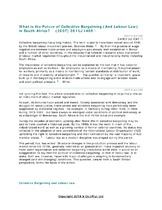| dc.contributor.author | Du Toit, Darcy | |
| dc.date.accessioned | 2013-08-20T14:20:11Z | |
| dc.date.available | 2013-08-20T14:20:11Z | |
| dc.date.issued | 2007 | |
| dc.identifier.issn | 0258249X | |
| dc.identifier.uri | http://hdl.handle.net/10566/684 | |
| dc.description.abstract | Introduction: Collective bargaining has a long history. The term is said to have been coined around 1890 by the British labour movement pioneer, Beatrice Webb. By then the practice of wage negotiations between trade unions and employers was already well-established in Britain and a number of other countries. In the decades that followed it became a key instrument of labour market regulation throughout the industrialized and industrializing world, including South Africa.
The importance of collective bargaining can be explained by the fact that it has value for employers as well as workers - for employers, as a means of maintaining 'industrial peace'; for workers, primarily as a means of maintaining 'certain standards of distribution of work, of rewards and of stability of employment'. The qualifier 'primarily' is important: power built up in the bargaining arena enables trade unions also to engage with broader issues and exert political pressure. | en_US |
| dc.language.iso | en | en_US |
| dc.publisher | Juta Law | |
| dc.rights | Copyright Juta Law. This file may be freely used provided that the source is acknowledged. No commercial distribution of this text is permitted. | |
| dc.subject | Collective bargaining | en_US |
| dc.subject | Wage negotiations | en_US |
| dc.subject | Labour law | en_US |
| dc.title | What is the future of collective bargaining (and Labour Law) in South Africa? | en_US |
| dc.type | Article | en_US |
| dc.privacy.showsubmitter | false | |
| dc.status.ispeerreviewed | true | |
| dc.description.accreditation | Department of HE and Training approved list | en_US |

